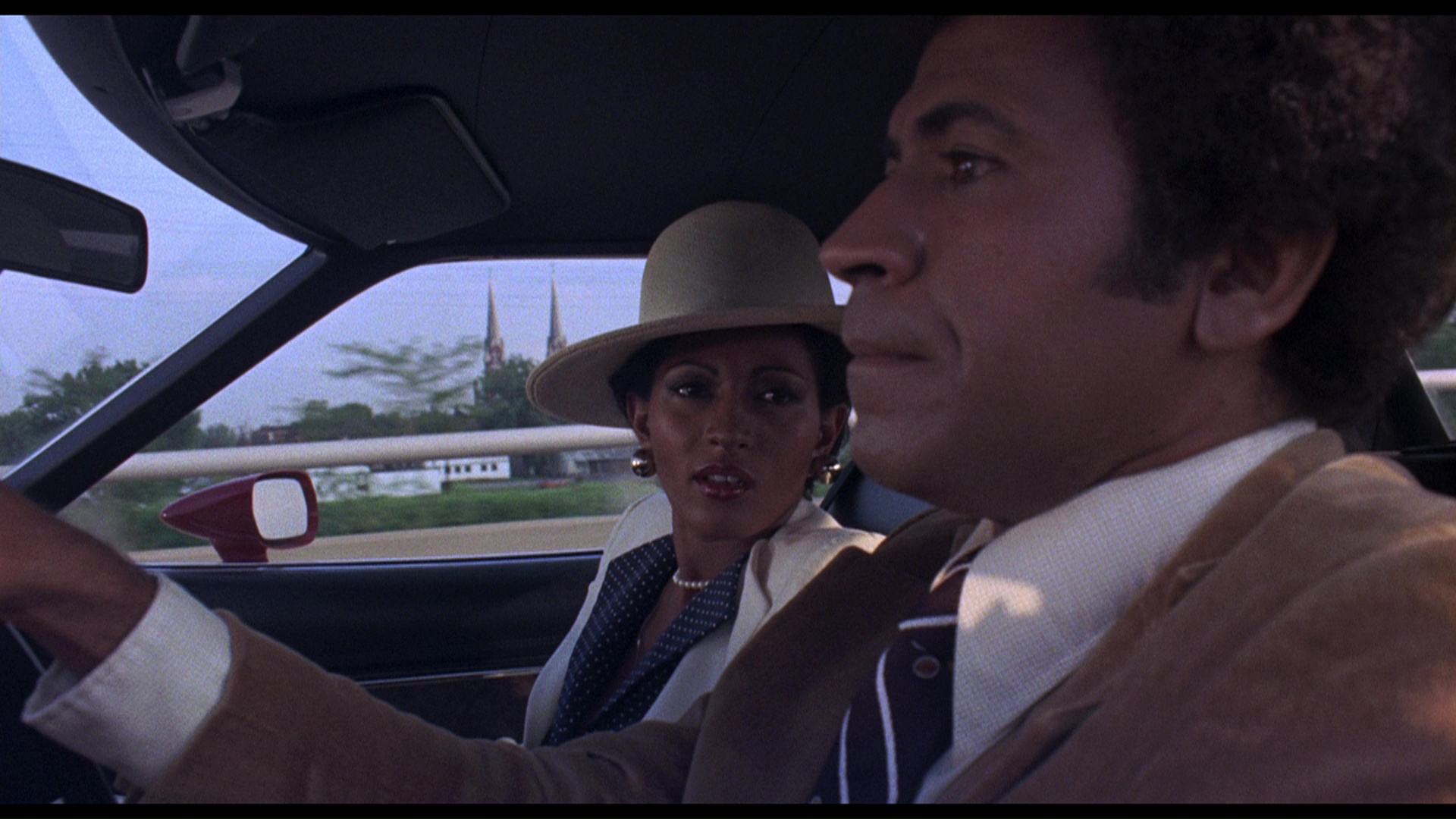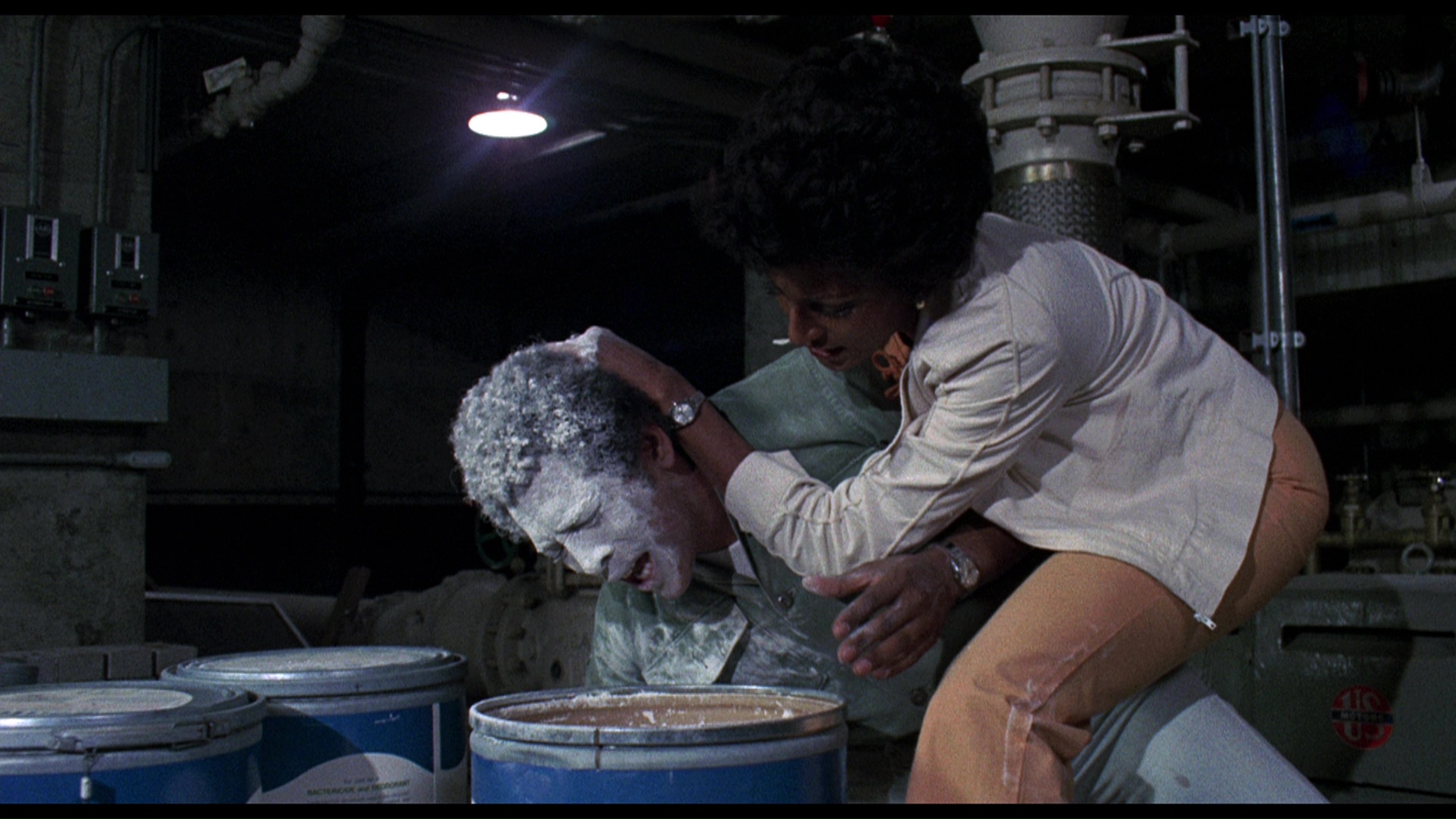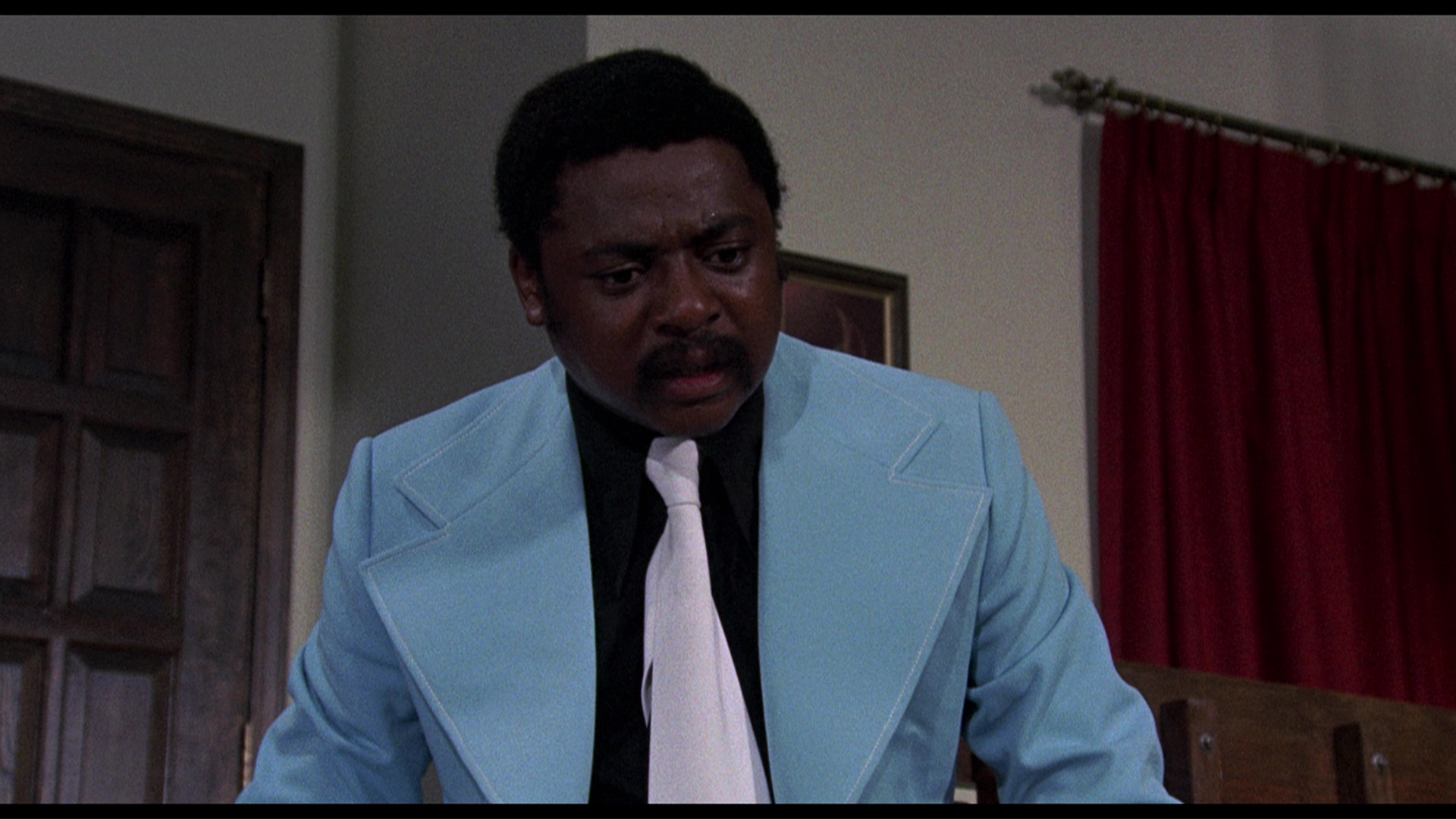

Color, 1975, 90m.
Directed by William Girdler
Starring Pam Grier, Austin Stoker, D'Urville Martin, Rudy Challenger, Dick Merrifield
Arrow Films (Blu-ray & DVD) (US/UK RA/B HD), MGM (DVD) (US R1 NTSC) / WS (1.85:1) (16:9)

 Pam Grier was firmly entrenched as a top blaxploitation star at American International Pictures thanks to a pair of beloved Jack Hill crime films, Coffy and Foxy Brown. However, she'd had enough of the combination of T&A, bloody violence, and drugs when it came time to make her next two action vehicles, this film for Louisville, Kentucky-based filmmaker William Girdler and a glossy all-star comic book adaptation, Friday Foster. Girdler was no stranger to blaxploitation after helming Zebra Killer with Austin Stoker and the ill-fated possession film Abby, which still hasn't had a legal home video release thanks to a legal clash between Warner Bros. and AIP. The last Louisville project for Girdler, Sheba, Baby reunited Girdler and Stoker and also brought in producer David Sheldon, who would go on to oversee Girdler's biggest box office hit, Grizzly. Sadly, the young director was tragically killed three years after making this film shortly after completing The Manitou.
Pam Grier was firmly entrenched as a top blaxploitation star at American International Pictures thanks to a pair of beloved Jack Hill crime films, Coffy and Foxy Brown. However, she'd had enough of the combination of T&A, bloody violence, and drugs when it came time to make her next two action vehicles, this film for Louisville, Kentucky-based filmmaker William Girdler and a glossy all-star comic book adaptation, Friday Foster. Girdler was no stranger to blaxploitation after helming Zebra Killer with Austin Stoker and the ill-fated possession film Abby, which still hasn't had a legal home video release thanks to a legal clash between Warner Bros. and AIP. The last Louisville project for Girdler, Sheba, Baby reunited Girdler and Stoker and also brought in producer David Sheldon, who would go on to oversee Girdler's biggest box office hit, Grizzly. Sadly, the young director was tragically killed three years after making this film shortly after completing The Manitou.
Grier stars here as Sheba Shayne, a private eye summoned home to Louisville after her father (Challenger) gets roughed up during an attack  on his local loan office. She teams up with her dad's business partner, Brick (Stoker), to shake down the racketeers they believe are involved, specifically a nasty hustler named Pilot (Martin, also returning from Zebra Killer) and plenty of other lowlifes. However, it soon appears that there's a larger, more sinister force at work here, forcing Sheba to slide on a wet suit and and infiltrate a swanky yacht to get to the bottom of the conspiracy.
on his local loan office. She teams up with her dad's business partner, Brick (Stoker), to shake down the racketeers they believe are involved, specifically a nasty hustler named Pilot (Martin, also returning from Zebra Killer) and plenty of other lowlifes. However, it soon appears that there's a larger, more sinister force at work here, forcing Sheba to slide on a wet suit and and infiltrate a swanky yacht to get to the bottom of the conspiracy.
Sheba, Baby has gotten a lot of flack over the years as the lone PG-rated Grier vehicle of the period, a result of her desire to  focus more on star power and a strong, glamorous image than bare flesh or grisly violence. That said, it's a pretty hard PG (which was common at the time) with some pretty wet blood squibs and a little toplessness that pushes the rating about as far it will go without upsetting any parental guardians. Grier seems to be having a lot of fun (she appears in almost every shot of the film) as she gets to engage in a lot of fun chase scenes (the best shot at the Louisville state fair) and pull out a gun a lot, which strangely doesn't seem to faze local law enforcement at all. Overall it's definitely weaker tea compared to the Jack Hill films, but Girdler keeps things clipping along well enough and delivers what amounts to a solid '70s action film seemingly designed to be shown on TV in the middle of the afternoon, which is usually where this ended up.
focus more on star power and a strong, glamorous image than bare flesh or grisly violence. That said, it's a pretty hard PG (which was common at the time) with some pretty wet blood squibs and a little toplessness that pushes the rating about as far it will go without upsetting any parental guardians. Grier seems to be having a lot of fun (she appears in almost every shot of the film) as she gets to engage in a lot of fun chase scenes (the best shot at the Louisville state fair) and pull out a gun a lot, which strangely doesn't seem to faze local law enforcement at all. Overall it's definitely weaker tea compared to the Jack Hill films, but Girdler keeps things clipping along well enough and delivers what amounts to a solid '70s action film seemingly designed to be shown on TV in the middle of the afternoon, which is usually where this ended up.
Sheba, Baby has been in circulation on home video regularly since Orion debuted it on VHS back in the '80s. The library's transition to MGM has kept it on DVD in various iterations including a solo DVD and inclusion in a Pam Grier set, always containing the theatrical trailer as the only extra. The 2016 dual-format Blu-ray and DVD set from Arrow Films in both the US and UK offers a significant video upgrade with a new HD transfer (the film has been conspicuously absent from airing on MGM HD) that benefits from over a decade of advances in transfer technology. Film grain is fine and natural, and detail looks impressive given the fact that the film was shot in natural daylight in many scenes. Some of the night scenes have always looked a bit underlit and continue to be so here, but that's just the nature of the source. The LPCM mono audio sounds excellent (a shame this is still the sole Grier AIP starrer whose soundtrack isn't currently available outside of secondhand vinyl), with optional English subtitles offered.The Blu-ray is Region A and B compatible, while the DVD appears to be region free. Two commentaries are also offered, one with producer Sheldon (moderated by yours truly) and another with Patty Breen, webmaster of williamgirdler.com (who also contributes liner  notes for the insert booklet). Between the two you get quite a bit of info about Girdler including his
notes for the insert booklet). Between the two you get quite a bit of info about Girdler including his  Louisville connections and how the story came about (originally with a different title), plus insight into the state of Grier's career at the time and how she got on with her director. There's a lot more about Sheldon to be found in the featurette "Sheldon, Baby," in which he chats more about his career including his start as an AIP exec up through his take on the incomplete all-star disaster that was Grizzly II. A good intro for newcomers and a solid listen for fans is the second featurette, "Pam Grier: The AIP Years," a video essay by Temple of Schlock's Chris Poggiali covering the ins and outs of her now-legendary tenure there from Black Mama White Mama through Drum. Basically if you want an in-depth bio of Grier's most famous period, this is where you want to go. Also included are the usual AIP trailer and a gallery of publicity shots and lobby cards, plus reversible cover options spotlighting a new design by Sean Phillips and the original poster art.
Louisville connections and how the story came about (originally with a different title), plus insight into the state of Grier's career at the time and how she got on with her director. There's a lot more about Sheldon to be found in the featurette "Sheldon, Baby," in which he chats more about his career including his start as an AIP exec up through his take on the incomplete all-star disaster that was Grizzly II. A good intro for newcomers and a solid listen for fans is the second featurette, "Pam Grier: The AIP Years," a video essay by Temple of Schlock's Chris Poggiali covering the ins and outs of her now-legendary tenure there from Black Mama White Mama through Drum. Basically if you want an in-depth bio of Grier's most famous period, this is where you want to go. Also included are the usual AIP trailer and a gallery of publicity shots and lobby cards, plus reversible cover options spotlighting a new design by Sean Phillips and the original poster art.
Reviewed on February 1, 2016.




 Pam Grier was firmly entrenched as a top blaxploitation star at American International Pictures thanks to a pair of beloved Jack Hill crime films, Coffy and Foxy Brown. However, she'd had enough of the combination of T&A, bloody violence, and drugs when it came time to make her next two action vehicles, this film for Louisville, Kentucky-based filmmaker William Girdler and a glossy all-star comic book adaptation, Friday Foster. Girdler was no stranger to blaxploitation after helming Zebra Killer with Austin Stoker and the ill-fated possession film Abby, which still hasn't had a legal home video release thanks to a legal clash between Warner Bros. and AIP. The last Louisville project for Girdler, Sheba, Baby reunited Girdler and Stoker and also brought in producer David Sheldon, who would go on to oversee Girdler's biggest box office hit, Grizzly. Sadly, the young director was tragically killed three years after making this film shortly after completing The Manitou.
Pam Grier was firmly entrenched as a top blaxploitation star at American International Pictures thanks to a pair of beloved Jack Hill crime films, Coffy and Foxy Brown. However, she'd had enough of the combination of T&A, bloody violence, and drugs when it came time to make her next two action vehicles, this film for Louisville, Kentucky-based filmmaker William Girdler and a glossy all-star comic book adaptation, Friday Foster. Girdler was no stranger to blaxploitation after helming Zebra Killer with Austin Stoker and the ill-fated possession film Abby, which still hasn't had a legal home video release thanks to a legal clash between Warner Bros. and AIP. The last Louisville project for Girdler, Sheba, Baby reunited Girdler and Stoker and also brought in producer David Sheldon, who would go on to oversee Girdler's biggest box office hit, Grizzly. Sadly, the young director was tragically killed three years after making this film shortly after completing The Manitou.  on his local loan office. She teams up with her dad's business partner, Brick (Stoker), to shake down the racketeers they believe are involved, specifically a nasty hustler named Pilot (Martin, also returning from Zebra Killer) and plenty of other lowlifes. However, it soon appears that there's a larger, more sinister force at work here, forcing Sheba to slide on a wet suit and and infiltrate a swanky yacht to get to the bottom of the conspiracy.
on his local loan office. She teams up with her dad's business partner, Brick (Stoker), to shake down the racketeers they believe are involved, specifically a nasty hustler named Pilot (Martin, also returning from Zebra Killer) and plenty of other lowlifes. However, it soon appears that there's a larger, more sinister force at work here, forcing Sheba to slide on a wet suit and and infiltrate a swanky yacht to get to the bottom of the conspiracy.  focus more on star power and a strong, glamorous image than bare flesh or grisly violence. That said, it's a pretty hard PG (which was common at the time) with some pretty wet blood squibs and a little toplessness that pushes the rating about as far it will go without upsetting any parental guardians. Grier seems to be having a lot of fun (she appears in almost every shot of the film) as she gets to engage in a lot of fun chase scenes (the best shot at the Louisville state fair) and pull out a gun a lot, which strangely doesn't seem to faze local law enforcement at all. Overall it's definitely weaker tea compared to the Jack Hill films, but Girdler keeps things clipping along well enough and delivers what amounts to a solid '70s action film seemingly designed to be shown on TV in the middle of the afternoon, which is usually where this ended up.
focus more on star power and a strong, glamorous image than bare flesh or grisly violence. That said, it's a pretty hard PG (which was common at the time) with some pretty wet blood squibs and a little toplessness that pushes the rating about as far it will go without upsetting any parental guardians. Grier seems to be having a lot of fun (she appears in almost every shot of the film) as she gets to engage in a lot of fun chase scenes (the best shot at the Louisville state fair) and pull out a gun a lot, which strangely doesn't seem to faze local law enforcement at all. Overall it's definitely weaker tea compared to the Jack Hill films, but Girdler keeps things clipping along well enough and delivers what amounts to a solid '70s action film seemingly designed to be shown on TV in the middle of the afternoon, which is usually where this ended up.
 notes for the insert booklet). Between the two you get quite a bit of info about Girdler including his
notes for the insert booklet). Between the two you get quite a bit of info about Girdler including his  Louisville connections and how the story came about (originally with a different title), plus insight into the state of Grier's career at the time and how she got on with her director. There's a lot more about Sheldon to be found in the featurette "Sheldon, Baby," in which he chats more about his career including his start as an AIP exec up through his take on the incomplete all-star disaster that was Grizzly II. A good intro for newcomers and a solid listen for fans is the second featurette, "Pam Grier: The AIP Years," a video essay by Temple of Schlock's Chris Poggiali covering the ins and outs of her now-legendary tenure there from Black Mama White Mama through Drum. Basically if you want an in-depth bio of Grier's most famous period, this is where you want to go. Also included are the usual AIP trailer and a gallery of publicity shots and lobby cards, plus reversible cover options spotlighting a new design by Sean Phillips and the original poster art.
Louisville connections and how the story came about (originally with a different title), plus insight into the state of Grier's career at the time and how she got on with her director. There's a lot more about Sheldon to be found in the featurette "Sheldon, Baby," in which he chats more about his career including his start as an AIP exec up through his take on the incomplete all-star disaster that was Grizzly II. A good intro for newcomers and a solid listen for fans is the second featurette, "Pam Grier: The AIP Years," a video essay by Temple of Schlock's Chris Poggiali covering the ins and outs of her now-legendary tenure there from Black Mama White Mama through Drum. Basically if you want an in-depth bio of Grier's most famous period, this is where you want to go. Also included are the usual AIP trailer and a gallery of publicity shots and lobby cards, plus reversible cover options spotlighting a new design by Sean Phillips and the original poster art.